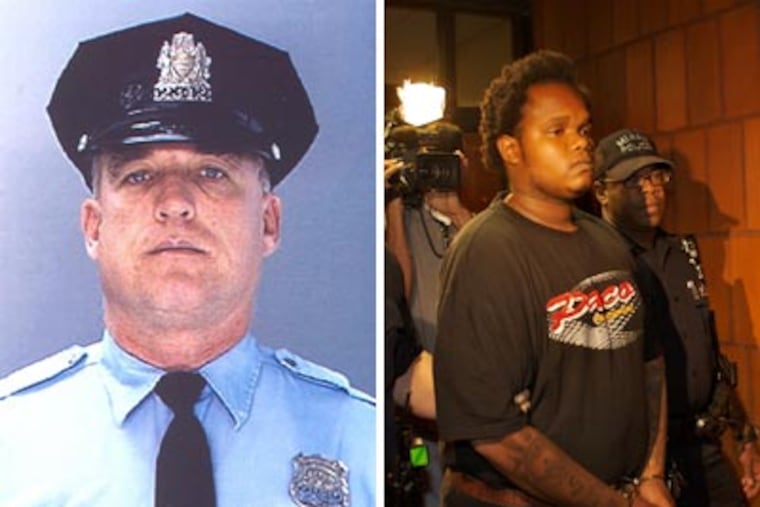Court hears of Lewis' desperate hideout, flight
For Lynn Dyches - mother, grandmother, Philadelphia correctional officer - the first three days of November 2007 were the beginning of her continuing nightmare.

For Lynn Dyches - mother, grandmother, Philadelphia correctional officer - the first three days of November 2007 were the beginning of her continuing nightmare.
The whole city was hunting for the killer of veteran Police Officer Chuck Cassidy. And here he was - her son, John "Jordan" Lewis - in her Hunting Park house, carrying the murder weapon and Cassidy's stolen 9mm service pistol, saying he would never surrender and would kill anyone in his way.
While Judy Cassidy, her three children, and thousands of city police officers were in shocked mourning, preparing to bury the popular 54-year-old officer, Dyches was making panicky calls to people to come and talk to her son.
Two she called - her boyfriend and fellow correctional officer, and her nephew - yesterday described the chaos inside Dyches' house and how Lewis escaped to Florida, where he was arrested three days later.
The testimony of Herbert Hill and Lewis' cousin Hakim Glover were the highlights of yesterday's session in Lewis' murder trial for killing Cassidy during an Oct. 31, 2007, robbery at a Dunkin' Donuts in North Philadelphia.
Prosecutors are expected to finish their case later today after four days of testimony.
Lewis has pleaded guilty to killing Cassidy as well as to six armed robberies. The jury's task is to decide whether the killing was first- or second-degree murder.
If the jury finds Lewis guilty of first-degree murder, it must decide whether he should be put to death or sentenced to life in prison without chance of parole. A second-degree verdict carries an automatic life sentence without parole.
Hill, a 22-year Philadelphia prisons correctional officer who dated Dyches, said Dyches called him at work on Nov. 3, 2007, "hysterical" and pleading for him to come to her house as soon as possible.
Dyches would not describe the emergency, Hill added.
When he arrived at Dyches' home, Hill said, he went to the back door and was let in. In the kitchen, Hill said, he saw Lewis, Dyches, Lewis' two sisters, and his 3-month-old daughter.
Though Dyches and the sisters were clearly upset, Hill said Lewis appeared calm.
"Tell him," Dyches ordered her son, according to Hill.
Lewis at first refused, then said: "I shot that cop."
Hill said he initially did not believe Lewis but then told the family that Lewis needed to get a lawyer and surrender to police.
"He said he was not going to turn himself in and that if the police come to get him, it's going to be a mess," Hill said.
When Assistant District Attorney Jennifer Selber asked Hill what he thought Lewis meant, the witness replied: "I assumed it was going to be a shoot-out."
Hill said he wanted to keep Lewis calm. "All I wanted was to find a way to get out of here."
Hill said he finally excused himself on the pretense that his car was illegally parked. He said he got in his car, drove away, and called 911, relayed what happened, and reported that Cassidy's killer was in Dyches' house.
By the time police arrived, however, Lewis was again on the run and would not be captured until Nov. 6, 2007, at a Miami homeless shelter.
Lewis got help from Glover, his older cousin, who ultimately agreed to drive Lewis to Wilmington and bought him a $231 round-trip bus ticket to Miami.
Glover, 26, who is awaiting sentencing after pleading guilty to helping Lewis elude police, spent a contentious hour on the witness stand testifying for the prosecution.
Glover made it clear to the jury and Assistant District Attorney Edward Cameron that he was angry because he feels police lied to him by arresting him after he told the truth about Lewis' escape.
But he was no less hostile toward defense attorney Michael Coard, who questioned if Glover had whitewashed his role and helped his cousin hide the two guns.
Glover angrily maintained that he had refused to help Lewis unless his cousin left the guns behind. Glover said he agreed to plead guilty and testify against Lewis because "I'm not going to jail for something I didn't do. I didn't kill nobody, I didn't shoot nobody, I didn't rob nobody!"
At times, Glover ranted so long that Cameron and Common Pleas Court Judge Jeffrey P. Minehart had to shout him down.
Glover admitted to Coard that it was a mistake for him to help Lewis escape but said he felt it was the only way to prevent a bigger tragedy.
"He said he was going to kill more cops and he said he was going to kill anybody else," Glover testified. "He really was suicidal."
When Coard pressed the point, Glover snapped back: "I made a mistake. . . . I wasn't thinking straight. I was intoxicated with love. I was intoxicated with love for that young man."
"I love you, too, man!" erupted Lewis from across the courtroom, as relatives of the cousins burst into loud sobs.